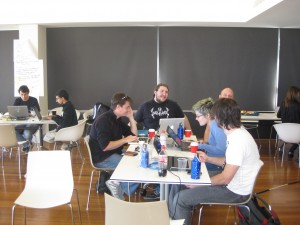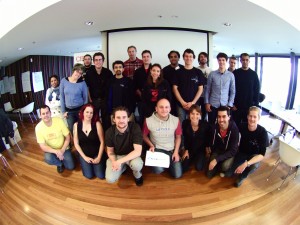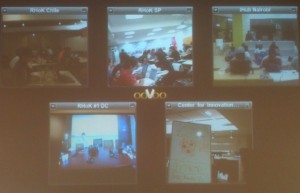Crowdsourcing during a Crisis is evolving. Here are some of the amazing activities that you can volunteer your knowledge and technical skills to help manage information, maps, and development. We may not save people and the geopolitical situation is very uncertain, however, using our skills may make a difference. If not today, then someday.
Reading articles about the plight in Pakistan from the Telegraph (UK) really provide some context. The UN and World Bank are also providing great communications about their activities.
Think of these activities as modeling: ASCII art evolved to HD Games. Each layer of knowledge, development and information that we collaborate and crowdsource can build a new future of aid. Maybe, just, maybe we might be able to help someone now. This motivates us all to try.
Crowdsourcing with tools to CrisisCamp, Map, Wiki, Tweet, Sahana, Google and more
Join a virtual CrisisCamp
CrisisCommons is a global network of volunteers who help people in times and places of crisis. If you can use the Internet, a word processor, a cell phone or any other kind of technology, you can help. Right now virtually online or during one of our many CrisisCamps around the world!
CrisisCamp Cambridge and CrisisCamp London had their first CrisisCamp last weekend. They continue to spearhead efforts. There are talks about France and Australia. Folks from Canada and the US have been supporting our UK friends. CrisisCamp Calgary and CrisisCamp Montreal have also been fully engaged for the past two weeks.
CrisisCamp – Pakistan 2010 Floods
Map
Mappers are waiting for Hi-res satellite maps of the affected regions. Folks are using existing maps, SMS notifications and amazing innovation.
Crowdmap
Ushahidi wrote a great blog post on how to crowdmap and the situation in Pakistan.
If you want to learn more, join the CrisisMappers googleggroups or OpenStreetMap Forums. (OpenStreetMap’s Humanitarian OSM Team investigating a response). The mailing lists are very noisy, but the discussions about open source, humanitarian aid, “do no harm”, collaboration and more are very engaging.
Wiki
Two great efforts to manage information with wiki:
(There is some talk about merging CrisisWiki and Pakistan.wikia.)
Tweet
The Twitter hashtag is #pkfloods. Search #pkfloods and you will find a wealth of information and calls to action. Many of the organizations mentioned in this post are using twitter for volunteer outreach, education, and mapping reports.
NEW: CrisisCamp Paris set up a live tweet/liveblog for #PKfloods:
Live Tweet/Liveblog from Canalblog
Ch16.org combines tweets, blogs etc
Tweak the Tweet from University of Colorado focuses on refining the signal to noise ratio with veracity during crisis response. They are an amazing group.
Learn how to use Twitter to help manage crisisdata.
Sahana
Sahana is a open source disaster management system. It is a web based collaboration tool that addresses the common coordination problems during a disaster from finding missing people, managing aid, managing volunteers, tracking camps effectively between Government groups, the civil society (NGOs) and the victims themselves.
They have set up an instance
A new SitRep module has been built to manage:
* Flood Reports
* Assessments from World Food Program
* School Reports
Sahana is looking for data entry and Python help.
Google
Google’s Crisis Response Team has released Person Finder and Resource Finder to provide help.
And more Social Media and Information Volunteering
Videos
Wouldn’t it be great if there was a YouTube channel dedicated Pakistan? It would be amazing if there was a channel dedicated to the humanitarian groups and their story to help. What about the diaspora in Canada, US, UK, and around the world?
Add any video links to the Crisis Commons wiki and please tweet them out with the #pkfloods tag.
Learn
Understanding Pakistan, her history and her people is really paramount. Knowledge is power.. I am looking for the best links on Pakistan to share with all the communities. Help us learn.
Add these to the Crisis Commons wiki and please tweet them out with the #pkfloods tag.
Share:
Please blog, tweet, map and wiki to collaborate. Every voice and action can count. Every volunteer can help with a computer. Maybe you will inspire someone else to volunteer.
My inbox is full and I am so proud to be engaged with such bright people. Unfortunately, I’m focused on a personal project and don’t have the bandwidth to create a CrisisCamp Pakistan right now. I would spend every waking hour doing all of the above. I can however blog and spread the word.
Change the world: You can too!


